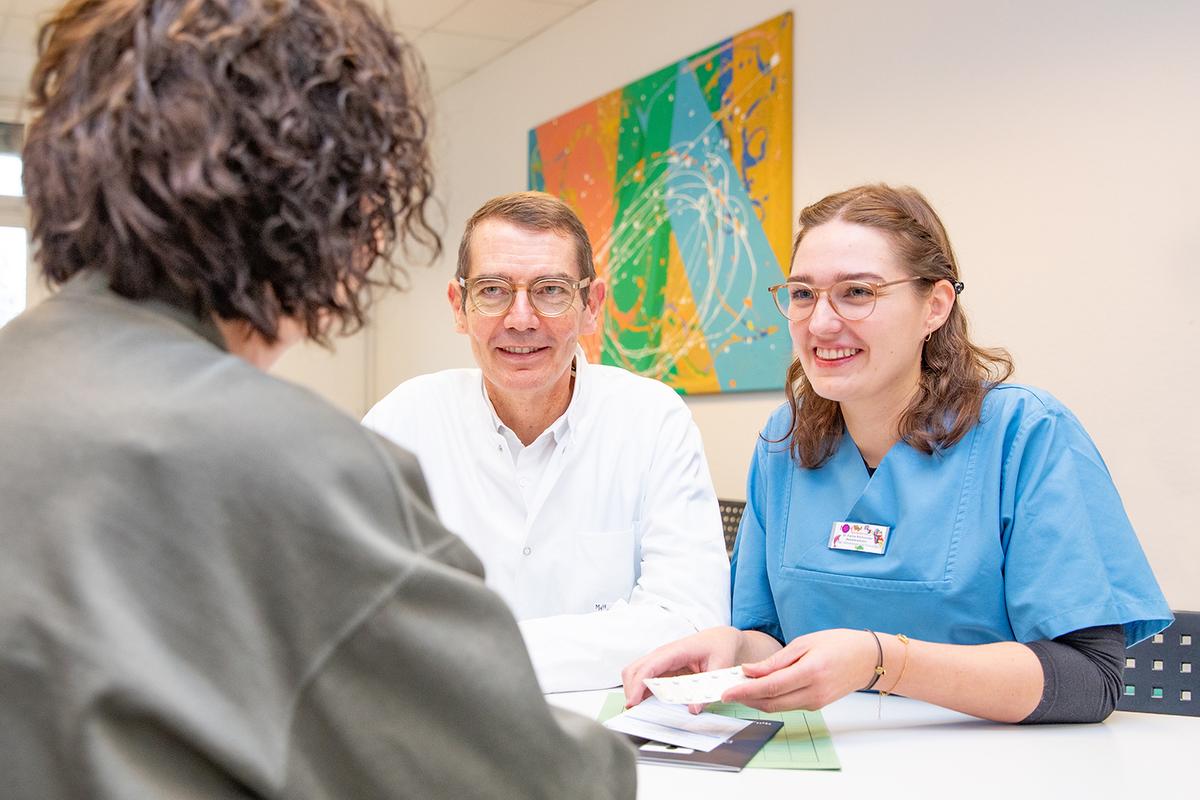German Cancer Aid study offers people with Li-Fraumeni syndrome new preventive strategies.

Does metformin help prevent cancer for LFS sufferers? Researchers Dr Farina Silchmüller and Professor Dr Christian Kratz from the MHH with a patient. Copyright: Karin Kaiser/ MHH
Li-Fraumeni syndrome (LFS) is a cancer predisposition syndrome (CPS) in which almost all sufferers are diagnosed with cancer at least once in their lives. Many are diagnosed as children or adolescents. In a new efficacy study, researchers at Hannover Medical School (MHH) are investigating for the first time whether cancer-free survival in LFS sufferers can be extended by taking metformin daily. Over a period of five to seven years, 300 patients will be included. The study is being funded with around 2.5 million euros from German Cancer Aid. Professor Dr Christian Kratz, Director of the Department of Paediatric Haematology and Oncology at MHH, is leading the study, which is due to start in summer 2025.
Participants can make an active contribution to personal cancer prevention
Metformin is a drug that is mainly used to treat type 2 diabetes. Preclinical studies suggest that the drug may be able to reverse changes that favour cancer in LFS. ‘In our study, patients have the opportunity to actively participate in cancer prevention. The disease burden of LFS significantly reduces an individual's quality of life. So far, there has been a lack of strategies to enable LFS patients to actively participate and improve their quality of life. This is where we can now start,’ explains Dr Farina Silchmüller, assistant physician at the Department of Paediatric Haematology and Oncology and co-initiator of the study.
Comprehensive cancer screening measures
Intensified cancer screening measures have been the recommended standard worldwide since birth, as they have been shown to have a positive impact on overall survival. Professor Kratz and his team are going one step further by investigating cancer-free survival in LFS patients who participate in cancer screening plus daily metformin use. Patients who participate in the screening programme without additional metformin administration will serve as a comparison group. The participants in the study are randomly assigned to a group.
Common types of cancer in LFS patients are breast cancer, soft tissue and bone sarcomas, brain tumours, leukaemias and adrenocortical carcinomas. ‘In the metformin group, the study participants take the drug daily under strict risk-minimising safety precautions.
In addition, all participants receive comprehensive examinations for early cancer detection such as annual whole-body MRI, head MRI, an annual ultrasound of the abdomen and pelvis and skin cancer screening,’ explains Dr Silchmüller.
Important basis for improved care
This study is the first to analyse the effectiveness of LFS as a cancer prevention measure. In addition, information on the psychological stress of the participants will be collected. This data is particularly helpful for treatment practice and will enable a large number of subsequent clinical studies. ‘Our goal is of course to improve survival and increase quality of life,’ explains Dr Silchmüller.
‘The concept was developed as part of an international collaboration. A comparable study is already underway in England, and studies are currently being planned in the USA and Canada. Together with our partners in other countries, we are planning an international meta-analysis in order to achieve even more meaningful results,’ says Professor Kratz.
MHH's Centre for Clinical Studies (ZKS), the Institutes of Biometry, Clinical Pharmacology and Diagnostic and Interventional Radiology and the Department of Psychosomatics and Psychotherapy are also involved in the study.
Text: Jana Illmer-Krüger